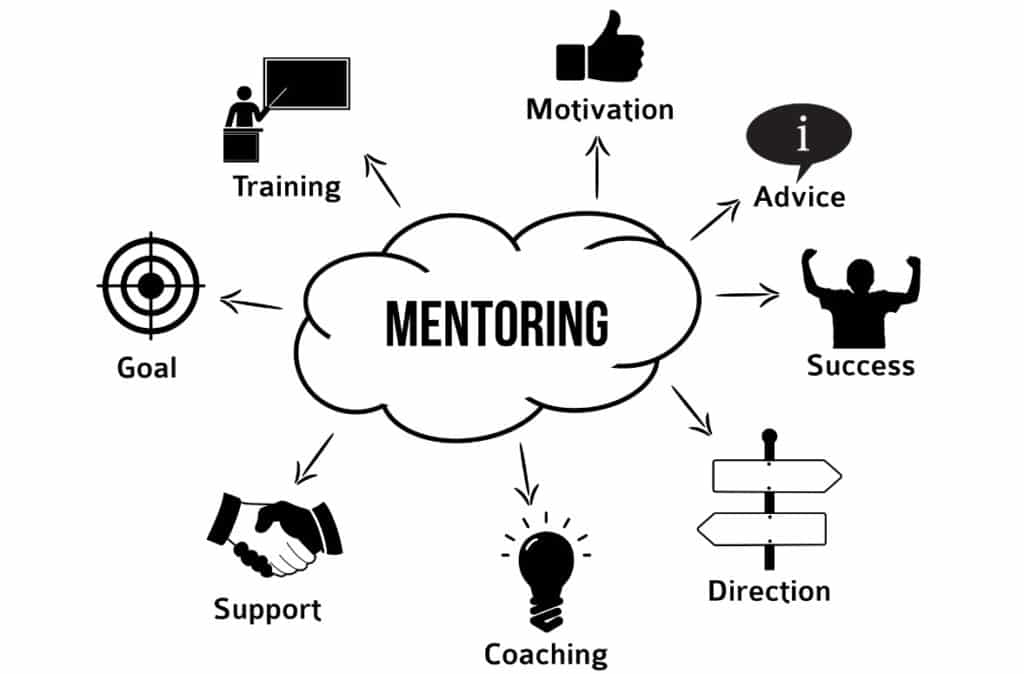Mentoring is an invaluable tool in personal and professional development, serving as a catalyst for growth, empowerment, and potential realization. The essence of mentoring lies in the symbiotic relationship between an experienced individual, the mentor, and a less experienced person, the mentee.
This relationship transcends traditional learning environments, offering tailored guidance, insights, and feedback that facilitate the mentee’s growth. This guide will take you through a deep exploration of mentoring’s importance, supplemented by real-life examples, to underscore the transformative power of effective mentorship.
The Importance of Mentoring
In an era marked by rapid advancements and increasing competitiveness, having a mentor is more critical than ever. The importance of mentoring spans across various aspects of life, from career development to personal growth and even mental wellbeing. Mentoring is more than just transferring skills or knowledge; it’s about fostering an empowering relationship that instills confidence, facilitates learning, and nurtures growth.
By providing insights from personal experiences, encouraging exploration, and offering support, mentors can significantly influence a mentee’s career path and personal development. Let’s delve deeper into the myriad ways mentoring plays a crucial role in our lives.

1. Personal and Professional Development
One of the primary roles of mentoring is to foster personal and professional development. It goes beyond the conventional boundaries of learning and instruction, opening doors to opportunities for growth that are personalized, unique, and applicable to the real world. Mentoring shapes individuals holistically, impacting not only their professional lives but also their personal attitudes, beliefs, and behaviors. Here’s how:
Skill Enhancement
Mentors often have a wealth of experience and knowledge in their field, which they pass on to their mentees. They can provide guidance on technical skills that are crucial to the mentee’s career advancement. But, they can also teach soft skills like communication, leadership, and emotional intelligence, which are essential for personal development and workplace success.
Goal Setting and Career Planning
Mentors can help mentees set achievable career goals and design a roadmap to attain them. By providing an external perspective, mentors can help mentees identify their passions, strengths, and potential career paths. They also provide valuable insights into industry trends, opportunities, and challenges that can shape the mentee’s career planning.
Self-Awareness and Self-Improvement
Mentors can facilitate self-reflection, helping mentees become more self-aware. They can assist in identifying strengths and areas for improvement. This self-awareness is key to personal development as it drives changes in behavior, helps in decision-making, and fosters resilience.
Work-Life Balance
Mentors can guide mentees on how to achieve a healthy work-life balance, something that many struggle with, especially in the early stages of their careers. By sharing their own experiences and strategies, mentors can provide practical tips on managing stress, prioritizing tasks, and setting boundaries.
2. Confidence Building
Confidence is an essential quality in personal and professional life. It influences how we interact with others, our decision-making process, our willingness to take on challenges, and our overall performance. A well-established mentorship relationship can be instrumental in building confidence. Here’s how:
Encouraging a Safe Environment for Experimentation
Mentors can create a safe, non-judgmental environment that encourages mentees to step out of their comfort zone and experiment with new ideas or methods. This supportive environment allows mentees to make mistakes and learn from them, fostering their problem-solving skills and enhancing their self-confidence.
Constructive Feedback
Mentors provide constructive feedback on mentees’ performance, decisions, and ideas. This honest feedback, coupled with guidance on improvement strategies, allows mentees to recognize their weaknesses and work towards overcoming them. It also helps them understand their strengths better, reinforcing their self-confidence.
Role Modeling
By virtue of their experience and accomplishments, mentors often serve as role models for their mentees. Seeing someone they admire and respect believe in them can bolster the mentees’ self-confidence. Additionally, observing the mentors’ confidence in handling various situations can provide a roadmap for mentees to develop their self-confidence.
Celebrating Successes
Mentors celebrate their mentees’ successes, no matter how small. This recognition and validation give mentees a sense of achievement, boosting their self-esteem and motivating them to take on more significant challenges.
Empowering Decision-Making
Mentors guide their mentees through the decision-making process without imposing their views. They encourage mentees to weigh the pros and cons, consider various perspectives, and make decisions independently. This empowerment instills confidence in mentees about their judgment and decision-making abilities.

3. Networking Opportunities
Networking is a cornerstone of professional growth. It opens doors to new opportunities, enhances knowledge, and can even accelerate career progression. A mentor can be a powerful ally in expanding a mentee’s network. Here’s how:
Providing Access to Industry Connections
Given their experience and standing, mentors often have well-established networks within their industry. They can introduce mentees to relevant contacts, such as potential employers, collaborators, or individuals who can provide further guidance or opportunities. These introductions can broaden the mentee’s professional reach and expose them to different perspectives and ideas.
Facilitating Collaborative Opportunities
Mentors can identify collaborative opportunities for mentees within their networks, such as projects, research, or initiatives that align with the mentee’s interests and career goals. These collaborations not only enhance the mentee’s experience and skill set but also allow them to connect with individuals within their field.
Guidance on Networking Best Practices
Mentors can offer advice on how to network effectively, such as making a strong first impression, maintaining professional relationships, and leveraging social media for professional networking. They can also share insights on the networking norms and etiquettes within the industry.
Promoting Visibility
Mentors can advocate for their mentees within their networks, promoting their achievements, skills, and potential. This increased visibility can make mentees more noticeable to key individuals within their industry, potentially leading to new opportunities.
Offering a Platform for Networking
In some cases, mentors may invite mentees to attend events, conferences, or meetings with them, providing a platform for mentees to meet and connect with other professionals.
4. Knowledge Sharing
Knowledge sharing is an integral part of mentorship. It forms the basis of the mentor-mentee relationship, providing a platform for learning, exploration, and growth. Here’s how knowledge sharing is facilitated in a mentorship relationship:
Skill and Experience Transfer
The most immediate form of knowledge sharing in mentorship is the transfer of skills and experiences from the mentor to the mentee. Mentors, with their vast experience and honed skills, can provide invaluable insights and guidance that books or classes might not offer. They can share their successes and failures, allowing mentees to learn from their journeys.
Feedback Loop
Mentorship provides a channel for constant feedback, facilitating a better understanding of the mentee’s strengths, weaknesses, and areas of improvement. Mentors can provide constructive feedback, while mentees can express their thoughts, ideas, and concerns, creating an open dialogue that enhances learning and understanding.
Nurturing Curiosity and Learning
Mentors encourage mentees to ask questions, explore new ideas, and learn continuously. They nurture their mentee’s curiosity and thirst for knowledge, fostering a love for lifelong learning.
Reciprocal Learning
While it might seem that the mentor is the primary knowledge provider, mentees can offer fresh perspectives, innovative ideas, and new skills that the mentor might not be familiar with. This exchange fosters mutual growth and learning, making the relationship reciprocal and beneficial for both parties.
Updates on Industry Trends
Mentors, often being active in their fields, can share the latest industry trends, best practices, and advancements with their mentees. This knowledge sharing keeps mentees up-to-date and ready for the changing professional landscape.
Real-Life Examples of Mentoring
Real-life examples often provide the most compelling evidence of the transformative power of mentorship. Below are three instances of mentor-mentee relationships that have left a mark on different sectors.
Steve Jobs and Mark Zuckerberg
The mentoring relationship between Apple co-founder Steve Jobs and Facebook CEO Mark Zuckerberg remains one of the tech industry’s most notable mentor-mentee pairings. Jobs provided invaluable guidance to Zuckerberg during Facebook’s formative years, advising him on team management, company building, and vision crafting. This mentorship significantly shaped Zuckerberg’s leadership style and the growth trajectory of Facebook.
Oprah Winfrey and Ava DuVernay
In the media and entertainment world, Oprah Winfrey’s mentorship of filmmaker Ava DuVernay stands out as a shining example of empowering mentorship. Winfrey’s guidance, support, and influence played a pivotal role in DuVernay’s career, helping her navigate the complexities of the film industry. This mentorship also represents a powerful instance of women supporting women in an industry often dominated by men.
Larry Page and Eric Schmidt
Larry Page, co-founder of Google, and Eric Schmidt, former CEO, exemplify successful mentorship in the corporate world. Schmidt, with his extensive experience, served as a mentor to Page during Google’s early stages, providing counsel that contributed significantly to Google’s unprecedented success.
Conclusion
To conclude, mentoring holds immense transformative power, with far-reaching implications for personal and professional development. By creating a conducive environment for knowledge sharing, confidence building, and networking, mentorship can vastly enhance career prospects and facilitate personal growth.
The examples of Steve Jobs and Mark Zuckerberg, Oprah Winfrey and Ava DuVernay, or Larry Page and Eric Schmidt, underscore the extraordinary outcomes that effective mentorship can yield. Whether you are a mentor or a mentee, engaging in a mentorship relationship marks a significant step towards lifelong learning, growth, and success.
